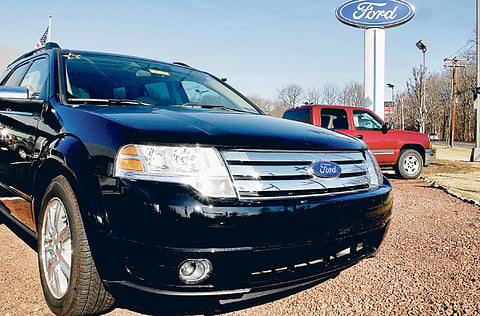Ford must be ready to face fragile economic recovery
Automaker rises to lead US car sales but won't restore stock dividends

Dearborn: Ford Motor Co., which rose to the lead in US auto sales last month, still must contend with the possibility of a ‘fragile' economic recovery and won't restore stock dividends soon, Chief Financial Officer Lewis Booth said.
"Have we seen the worst in our business? Probably," he said yesterday in an interview in New York. "It all depends on the economy."
Ford ended three years of losses in 2009 with net income of $2.7 billion and forecasts a pretax operating profit this year. The Dearborn, Michigan-based company passed General Motors Co. in February to lead US monthly auto sales for the first time since 1998.
"There are some hurdles ahead of us and the most obvious hurdle is, how fragile is the economic recovery?" Booth said. Ford is planning for a "modest recovery," he said.
Dividends
Ford is unlikely to soon bring back dividends on its common and preferred shares because "we still have huge demands on our cash," Booth said. "I wouldn't want to raise people's expectations or hopes."
The last payout on the common shares was September 1, 2006. Ford hasn't paid a dividend on its Capital Trust II preferred stock since January 15, 2009, and has said it would defer payments for as long as five years. Ford forecast US industrywide sales of 11.3 million to 12.3 million cars and light trucks this year, rising from 10.4 million in 2009, which was the lowest since 1982. The annual average from 2000 to 2007 was 16.8 million.
The company gained US market share last year for the first time since 1995 with new models such as the revamped Taurus sedan while the predecessors of GM and Chrysler Group LLC reorganised in bankruptcy with federal aid. Ford also has trimmed 47 per cent of its North American workforce since 2006 and is rolling out fuel-efficient small cars such as the Fiesta.
"We're a changed company," Booth said. "The test for Ford is to be consistent and predictable in our improvements."
Ford managed to avoid the fate of its US rivals by borrowing $23 billion in late 2006 before credit markets froze. The automaker put up all major assets, including the Ford name, as collateral to build a cash cushion to withstand losses while developing new models.
Ford had $34.3 billion of automotive debt at the end of last year, putting it at a competitive disadvantage with GM and Chrysler, which had their obligations reduced in bankruptcy, according to Booth.
Travails
"We've made no secret of having too much debt on our balance sheet as a result of the travails of 2008 and 2009," he said. "The best way to solve our balance sheet is to get the business back to profitability."
Ford is still "years away" from achieving investment-grade credit ratings, Booth said. "We‘ve got a lot of steps to go. This is not a months issue."
Turning against toyota
Americans are turning against Toyota Motor after sudden-acceleration complaints forced it to recall more than eight million vehicles worldwide, while Ford Motor is the most popular automaker.
More than four in 10 Americans say they "would definitely not buy a Toyota," according to the Bloomberg National Poll. The Japanese company is viewed unfavourably by 36 per cent of those interviewed, the highest negative rating in the survey, while fewer than half — 49 per cent — have a favourable impression. Ford, the only US automaker that didn't seek a federal rescue, is seen favourably by 77 per cent of those surveyed, topping No. 2 Honda Motor Co. by seven percentage points.
Sign up for the Daily Briefing
Get the latest news and updates straight to your inbox



